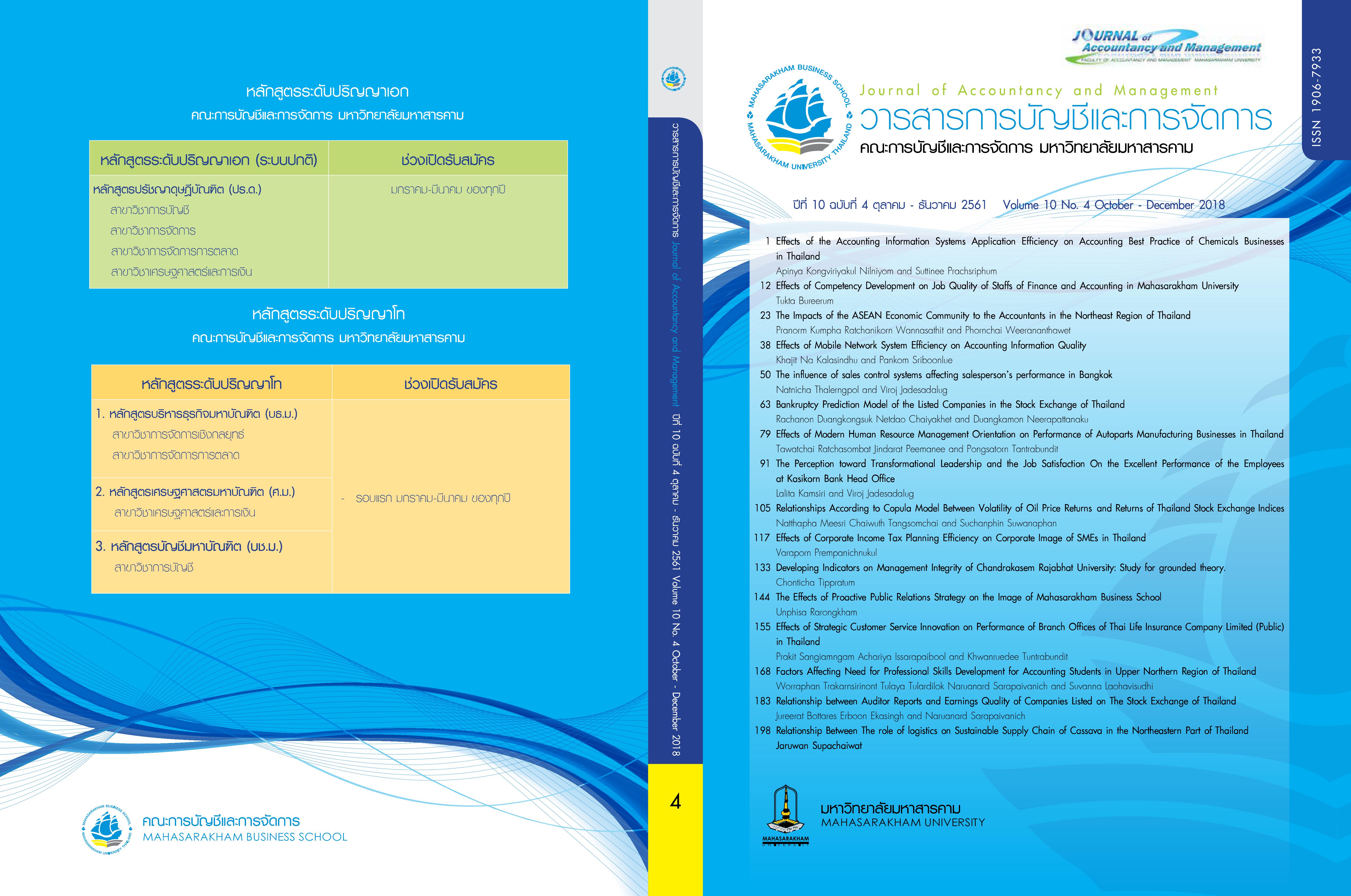ผลกระทบของประสิทธิภาพของระบบเครือข่ายเคลื่อนที่ ต่อคุณภาพของสารสนเทศทางการบัญชี
Main Article Content
บทคัดย่อ
การวิจัยครั้งนี้มีจุดประสงค์ เพื่อทดสอบผลกระทบของประสิทธิภาพของเครือข่ายเคลื่อนที่ที่มีต่อคุณภาพของสารสนเทศทางการบัญชีของกิจการร้านอาหารในประเทศไทย
โดยใช้แบบสอบถามเป็นเครื่องมือในการเก็บรวบรวมข้อมูลจากผู้บริหารกิจการร้านอาหารในประเทศไทย จำนวน 156 คน สถิติเชิงพรรณนาและสถิติอ้างอิง อาธิเช่น ค่าเฉลี่ย ส่วนเบี่ยงเบนมาตรฐานการวิเคราะห์สหสัมพันธ์พหุคูณ และการวิเคราะห์การถดถอยแบบกำลังสองน้อยที่สุดได้ถูกนำมาใช้ในการวิเคราะห์งานวิจัยในครั้งนี้ ผลการวิจัยแสดงให้เห็นว่า ประสิทธิภาพของ
เครือข่ายเคลื่อนที่ ทั้งในด้านความพร้อมใช้งานและคุณภาพในการเชื่อมต่อ ด้านการตอบสนอง ด้านความเชื่อถือได้ของระบบ และด้านคุณภาพของส่วนติดต่อกับผู้ใช้งานมีความสัมพันธ์และ
ผลกระทบเชิงบวกกับคุณภาพสารสนเทศทางการบัญชี ดังนั้นผู้บริหารกิจการร้านอาหารในประเทศไทยจึงควรให้ความสำคัญต่อประสิทธิภาพของเครือข่ายเคลื่อนที่ เพื่อเป็นแนวทางใน
การปรับปรุงและพัฒนาคุณภาพและประสิทธิภาพของข้อมูลทางการบัญชีของกิจการ ทั้งยังก่อให้เกิดประโยชน์แก่เจ้าของกิจการผู้ที่มีความสนใจในการประยุกต์ใช้เครือข่ายเคลื่อนที่ใน
การสนับสนุนและส่งเสริมประสิทธิภาพในการดำเนินกิจการไปสู่ความสำเร็จอย่างยั่งยืน
Downloads
Article Details
บทความที่ได้รับการตีพิมพ์เป็นลิขสิทธิ์ของวารสารการบัญชีและการจัดการ
ข้อความที่ปรากฏในบทความแต่ละเรื่องในวารสารวิชาการเล่มนี้เป็นความคิดเห็นส่วนตัวของผู้เขียนแต่ละท่านไม่เกี่ยวข้องกับมหาวิทยาลัยมหาสารคาม และคณาจารย์ท่านอื่นๆในมหาวิทยาลัยฯ แต่อย่างใด ความรับผิดชอบองค์ประกอบทั้งหมดของบทความแต่ละเรื่องเป็นของผู้เขียนแต่ละท่าน หากมีความผิดพลาดใดๆ ผู้เขียนแต่ละท่านจะรับผิดชอบบทความของตนเองแต่ผู้เดียว
เอกสารอ้างอิง
Abdelsalam, O. H. & Street, D. L. (2007). Corporate governance and the timeliness of corporate internet reporting by U.K. listed companies.
Journal of International Accounting, Auditing and Taxation, 16, 111-130.
Armstrong, J. S. & Overton, T. S. (1977). Estimating nonresponse bias in mail surveys. Journal of Marketing Research, 14(3), 396-402.
Aulakh, P. S., Kotabe, M., & Teegen, H. (2000). Export strategies and performance of firms from emerging economies: evidence from Brazil, Chile, and Mexico.
Academy of Management Journal. 43(3), 342-361.
Balasubramanian, S., Peterson, R. A., & Jarvenpaa, S. L. (2002). Exploring the implications of M-commerce for markets and marketing. Journal of the Academy
of Marketing Science, 30, 348.
Barney, J. B. (1991). Firm resources and sustained competitive advantage. Journal of Management, 17, 99-120.
Bhatt, G. D. & Grover, V. (2005). Types of information technology capabilities and their role in competitive advantage: An empirical study.
Journal of Management Information Systems, 22(2), 253-277.
Cheng, M. & Neamtiu, M. (2009). An empirical analysis of changes in credit rating properties: Timeliness, accuracy and volatility.
Journal of Accounting and Economics, 47, 108-130.
Durbin, J. & Watson, G. S. (1971).Testing for serial correlation in least squares regression III. Biometrika. 58(1): 1–19.
Hair J. F., Black, W. C., Babin B. J., Anderson, R. E., & Tatham, R. L. (2006). Multivariate data analysis (6th ed.).
New Jersey: Pearson Education International.
Hair, J. F., Black, W. C., Babin, B., Anderson, R. & Taltham, R. L. (2010). Multivariate data analysis. USA: Pearson Education International.
Ismail, N. A. & King, M. (2005). Firm performance and AIS alignment in Malaysian SMEs. International Journal of Accounting Information Systems,
6(4), 241-259.
Kim, M.-K., Park, M. C., & Jeong, D.-H. (2004). The effects of customer satisfaction and switching barrier on customer loyalty in Korean mobile
telecommunication services. Telecommunications Policy, 28(2), 145-159.
Kleijnen, M., De Ruyter, K., & Wetzels, M. (2007). An assessment of value creation in mobile service delivery and the moderating role of time consciousness,
Journal of Retailing, 83(1), 33-46.
Konthong, K. & Ussahawanitchakit, P. (2009). Management accounting information system effectiveness and business value creation: An empirical study of
Thai listed firms. Review of Business Research, 9, 95-107.
Konthong, K. & Ussahawanitchakit., P. (2010). AIS competency, accounting outcomes, and firm performance: an empirical study of Thai-listed firms.
Journal of International Management Studies, 10, 43-67.
Krolick, D. L. (2005). The relevance of financial statement information for executive performance evaluation: Evidence from choice of bonus plan
accounting performance measures. The International Journal of Accounting, 40, 115-132.
Kuo, Y.-F., Wu. C.-M., & Deng, W.-J. (2009). The relationships among service quality, perceived value, customer satisfaction, and post-purchase
intention in mobile value-added services. Computer in Human Behavior, 25, 887-896.
Lin, H. F. (2013). Determining the relative importance of mobile banking quality factors. Computer Standards & Interfaces, 35, 195–204.
Neely, M. P. & Cook, J. S. (2011). Fifteen years of data and information quality literature: developing a research agenda for accounting.
Journal of Information Systems, 25, 79-108.
Nunnally, J. C. & Bernstein, I. H. (1994). Psychometric theory. New York: McGraw-Hill.
Orens, R. & Lybaert, N. (2007). Does the financial analysts’ usage of non-financial information influence the analyst’s forecast accuracy? Some evidence from
the Belgian sell-side financial analyst. The International Journal of Accounting, 42, 237-271.
Özer, A., Argan, M. T., & Argan, M. (2013). The effect of mobile service quality dimensions on customer satisfaction. Procedia – Social and Behavioral Sciences,
99, 428-438.
Sin, L. Y. M., Tse, A. C. B., Heung, V. C. S., & Yim, F. H. K. (2005). An analysis of the relationship between market orientation and business performance
in the hotel industry. Hospitality Management, 24, 555-577.
Vorhies, D. W., Morgan, R. E., & Autry, C. W. (2009). Product-market strategy and the marketing capabilities of the firm: impact on market effectiveness
and cash flow performance. Strategic Management Journal, 30(12), 1310-1334.
Wang K. & Lin, C. L. (2012). The adoption of mobile value-added services: investigating the influence of is quality and perceived playfulness. Managing Service Quality,
22 (2):184–208.
Yang, Z., Cai, S., Zhou, K. Z., & Zhou, N. (2005). Development and validation of an instrument to measure user perceived service quality of information
presenting Web portals. Information & Management, 42(4):575-589.
Zhang, M. J. & Lado, A. A. (2001). Information systems and competitive advantage: a competency-based view. Technovation, 21(3): 147-156.


